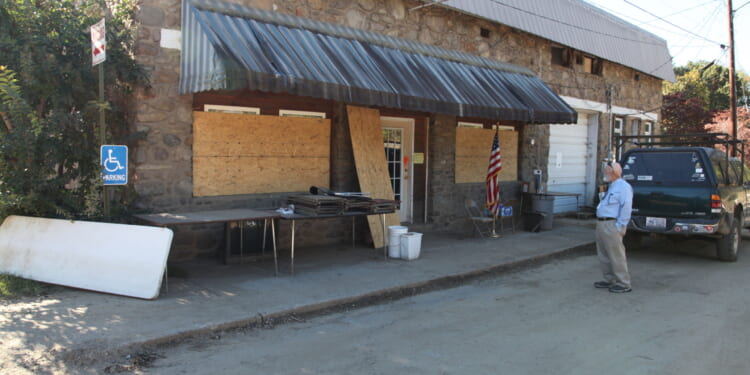Cover photo: Madison County Board of Elections member Dyatt Smathers stands outside the former early voting site in Hot Springs, North Carolina, October, 2024.
While government actions after Hurricane Helene struck western North Carolina have gotten mixed reviews, the performance of election officials was almost universally praised. That performance is worth remembering one year later.
Uneven post-Helene recovery efforts
There have been disputes over post-Helene recovery efforts in North Carolina. One thing everyone seemed to agree on, however, was that the North Carolina Office of Recovery and Resiliency (NCORR) needed to be kept away from Helene recovery efforts. The organization, created by Gov. Roy Cooper to organize recovery efforts after hurricanes Mathew (2016) and Florence (2018), failed spectacularly:
Inexplicably, NCORR generated an estimated $319 million budget deficit while only completing homes for 68 percent of the families in the [Homeowner Recovery Program]. Now, with 1,364 homes damaged by Matthew and Florence still left to complete, the victims of Hurricane Helene have been placed at the back of the line, waiting on NCORR to handle those unfulfilled promises.
Gov. Josh Stein wisely chose to sideline NCORR, saying “We want every dollar dedicated to recovery, whether federal, state, local or charitable to be spent as efficiently, impactfully and quickly as possible.” However, a report by the Office of the State Auditor revealed that at least some Helene recovery spending has been plagued by the same mismanagement that hampered the Matthew and Florence recovery efforts.
Officials made the election happen for voters affected by Helene
One post-Helene bright spot was the performance of local election officials. Helene hit western North Carolina on September 17, after absentee voting had started and just three weeks before the start of early voting. Despite that, election officials were able to ensure that “citizens in the affected counties who want to vote will be able to do so.” They were supported in that effort by the State Board of Elections and the General Assembly, both of which approved emergency measures to help voting. The General Assembly also passed legislation that had the effect of requiring more early voting sites in Henderson and McDowell counties.
I had an opportunity to witness that dedication in a visit during early voting to two counties affected by Helene:
During my visit to Yancey and Madison counties, I got a first-hand account of what those communities went through, their resiliency in the face of disaster, and the generosity of the people who have responded to their needs.
I also got a first-hand account of how local election officials are responding to the crisis and how support from the General Assembly and the State Board of Elections have helped them with that response. While some voters in western North Carolina may still have difficulty casting their ballot, the 13 counties most severely impacted by Helene have so far had higher voter turnout than the rest of North Carolina.
That is a testimony to both the resiliency of the people of western North Carolina and the dedication of the election officials and workers to making sure they can exercise their right to vote.
The United States Election Assistance Commission recognized the Buncombe County and North Carolina State boards of elections with the Clearinghouse Award in Contingency Planning: Exemplary Contingency Planning and Emergency Response Efforts for their before and after Helene struck.











